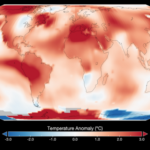
The wildfire in Greece have been burning for eight days and have been declared the largest in the EU in 2023.
Greece has experienced one of its longest heatwaves, with temperatures reaching up to 45°C, according to the Hellenic National Meteorological Service.
Wildfires have ravaged forests, displacing both wildlife and communities. Tourists who once sought solace in Greece’s beauty now bear witness to its vulnerability.
- Since 17 July 2023, the largest wildfire in Greece has been burning for the eighth day near the city of Alexandroupolis in the northeast.
- The fires have burned at least 2,832 hectares of land and destroyed homes and forests.
- At least 21,500 people are displaced.
- 24 people have died in the wildfires as of August 24, 2023.
- Dozens of firefighters have been injured while battling the fires.
- Climate scientists argue that climate change plays a significant role in the cause of the wildfires.
What caused the Greece wildfire
The cause of the Greece wildfires is a topic of debate, with some suggesting arson as the main cause and others pointing to the role of climate change.
- Local authorities have suggested that some of the wildfires, such as the ones on the island of Corfu, were the work of arsonists
- Climate scientists argue that climate change plays a significant role in the wildfires. They point out that of the past Greek wildfires with a verified
- ignition cause, only 23% were caused by arson, while most arose from fires on farmland initially started by other means
While arson may be a factor in some of the Greece wildfires, most of the fires are believed to be caused by a combination of human activities and the effects of climate change.
The escalating rate of intense fires may be linked to global warming approaching 1.5°C, though it’s possible to reduce the severity of the worst outcomes by slashing greenhouse gas emissions that are contributing to severe weather conditions.
What measures are being taken to prevent future wildfires
As the fires rage, so does public anger about what some have described as an inadequate government response to what is becoming an all too familiar problem in Greece and other regions of Southern Europe.
In 2022 several measures were being taken to prevent future wildfires in Greece:
- The Greek government has invested €72 million in wildfire prevention through its Antinero program. This program covers 77,000 hectares (190,271 acres) of forest, 12,000 kilometers (7,456 miles) of fire trails, and 1,600 kilometers of firebreaks.
- The government implemented a national warning system.
- Local municipalities developed Local Action Plans for Forest Fire Prevention.
- The government worked to educate the public about the dangers of wildfires and the role that human activities play in starting them.
The effects of climate change were to be addressed, as rising temperatures and longer periods of drought make forests more vulnerable to fires.
Efforts were being made to reduce greenhouse gas emissions and promote sustainable practices to mitigate the effects of climate change.
A Collective Effort
Addressing the impact of climate change on tourist destinations requires a collective effort. Governments, businesses, and travellers themselves must work together to prioritise sustainable practices. Only through this collaboration can we hope to preserve the natural wonders that draw us to these destinations in the first place.
Act now! Calculate your carbon footprint using our Carbon Offset Calculator.


